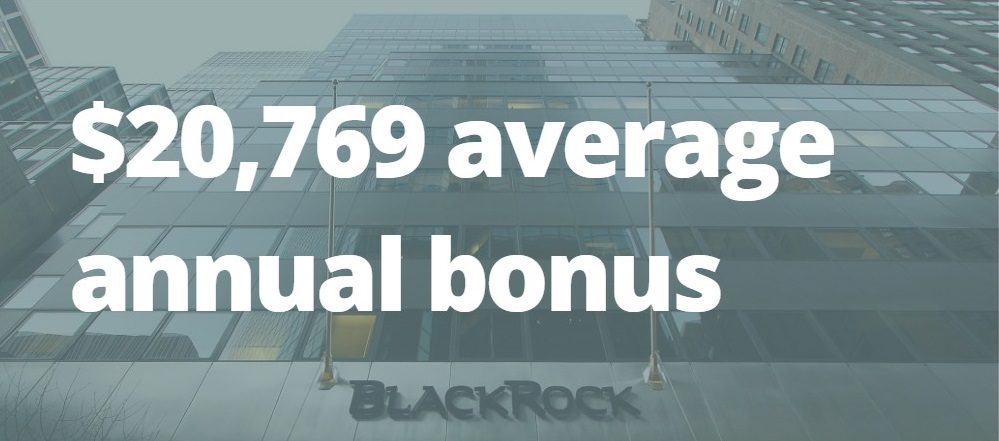MBA Job Opportunities: BlackRock

Though many MBA grads are passionate about their career prospects, those driven to work in the financial industry may be more reticent to commit to a life of uncomfortable suits and harsh fluorescent lights. A TINYpulse study found that employees at financial service companies have some of the lowest career satisfaction rates out there, despite stable salaries. The study put the amount of financial service employees who are happy with their work environment at less than 22 percent. In fact, an eFinancialCareers study found that one third of bankers hate their jobs. So, does an MBA and a penchant for finance mean a life of tolerating punishing work hours with little recognition from colleagues and superiors? Not necessarily.
Recent MBA grads with a penchant for finance will be pleased to learn that BlackRock, Inc., one of the largest asset-management companies in the world, provides a different kind of environment from the majority of financial institutions. Business Insider consistently ranks BlackRock as one of the premier financial employers in the U.S, writing, “The firm is big on employee development plans and employee engagement. For example, employees get to pitch ideas to senior executives at the two-day Innovation Summit, which helps spur new products for retirees and connect coworkers across different departments, according to LinkedIn.”
Why Work at BlackRock?
In a Business Insider interview, Jeff Smith, Senior Managing Director at BackRock’s Head of Global Human Resources Group, called BlackRock, “… an incredibly passionate place with a very clear sense of purpose that comes from Larry Fink, our founder and CEO, to everyone else in the company.”
BlackRock is renowned for its relaxed corporate culture, and 73 percent of its employees report high job satisfaction. The company employs over 130 investment teams in 30 different countries, so there is ample opportunity to join BlackRock beyond its New York City headquarters.
BlackRock’s effort to create a successful and diverse environment has been nothing short of empowering. Since 2015, over 2000 of the company’s prominent employers joined in the “Driving Better Decisions” initiative, which aims to help remove “unconscious bias” in decision-making, according to the official BlackRock website, as well as rethink the way human resources recruits and develops diverse talent. While the gender ratio at the company is still predominantly male, BlackRock has also made a concerted effort to increase female employment in senior management roles to 30 percent by the end of the decade, signing the HM Treasury’s Women in Finance Charter.
Pay Day
According to recent PayScale survey figures, MBA grads, despite their role, earn around $86,000 annually at BlackRock. These figures fluctuate depending on the specific role, rising to as much as $316,000 per year for investment strategists. According to the same data, bonuses at the company are also pretty exceptional. Portfolio managers reported an average bonus of $39,000 per year, while even the lowest bonus figures neared $10,000 per year.

Figures according to PayScale data.
Interning at BlackRock
For students nearing the end of their higher education journey, BlackRock offers summer internships for a glimpse of life at the company. BlackRock’s global Analyst Program is a two year-long entry level program for new graduates. The program kicks off with a training in New York City. Throughout the program, trainees will develop their skills in communicating with clients and understanding how to help them manage fiduciary matters.
BlackRock offers several other internships, and is conscious of promoting diversity in their industry. The Founders Scholarship provides merit rewards and a summer internship to students who identify as Black, Hispanic, Native American, LGBTQ, or disabled. Merit awards for this scholarship can be as high as $15,000.
Getting Hired
In an interview with eFinancialCareers, Jonathan Jones, director of global campus recruiting at BlackRock, gave some insight into how interested candidates can get their foot in the door at the company.
“What I think makes a BlackRock person stand out though, is that we look for people who embody or represent our principles. For example, we have a commitment to innovation. Innovation—original thinking, problem solving, and creativity – is central to our identity. Equally, we have a strong commitment to teamwork, and we look for people who can join the dots between our disparate activities in ways which can solve problems for our clients,” Jones said.
According to Jones, BlackRock hires many recent university graduates with Bachelor’s degrees, and the company also hires MBA candidates who have work experience that is relevant to specific positions, such as real estate and equity research.
A recent highlight from Clear Admit on the best business school’s for MBA grads that want to break into the industry that these five schools produced the most finance employees:
- Columbia Business School
- University of Chicago Booth School of Business
- New York University Stern School of Business
- University of Pennsylvania’s Wharton School
- Cornell Johnson Graduate School of Management
BlackRock has been actively recruiting at the world’s high ranking universities, stopping by Columbia Business School as recently as last month for an information session. Read here to find out for more events the company is hosting in the coming weeks and months and check out more about a potential career with BlackRock below.
To Be Out—or Not to Be Out—in Your MBA Application?

In honor of yesterday’s National Coming Out Day, we thought we’d tackle a thorny question faced by some applicants to leading business schools: To be out—or not to be out—in your MBA application? In recent years, increasing numbers of top business schools have given applicants the opportunity to disclose their sexual orientation as lesbian, gay, bisexual, transgender, or queer (LGBTQ) as part of their application if they so choose. But what are the pros and cons of doing so? To find out, we spoke with admissions directors at schools all over the country to get their input.
The overwhelming consensus, we found, was that there are multiple positives and few, if any, negatives to sharing your sexual orientation as part of the application process provided you feel comfortable doing so. This is not to say that anyone should feel pressured to disclose anything that they are not personally comfortable sharing—just that those who feel inclined to share shouldn’t have any hesitation from an admissions standpoint.
“I Really Only See Pros”
“I really only see pros,” says Soojin Kwon, managing director of full-time MBA admissions at the University of Michigan’s Ross School of Business. “We are always encouraging applicants to be very authentic and bring their whole selves so that we have context around them. We are a very diverse and inclusive community, and we want to know every aspect of who you are and what you’ll bring to that community.”
Applicants who do disclose LGBTQ status—or even those who don’t—also can indicate that they would be interested in hearing from students in the school’s Out for Business student club, which helps prospective students get tapped into the campus LGBTQ community well before they arrive on campus. “Our current LGBTQ students absolutely reach out, embrace, and actively engage with applicants who self-identify because they want to make sure that our community is very strong on every aspect of diversity—they are very proactive,” Kwon says.
NYU Stern School of Business Associate Dean of MBA Admissions Isser Gallogly stresses that whether or not to disclose sexual orientation is a personal choice that should be based on each individual’s comfort level. “But certainly at NYU Stern—in New York’s Greenwich Village—we are obviously incredibly diverse and supportive of diversity,” he says. The LGBTQ rights movement can trace its origins to the neighborhood surrounding Stern, and a community of acceptance has prevailed there for decades.
“It Might Present Certain Advantages”
But even beyond Greenwich Village and Stern, Gallogly tells LGBTQ applicants that they shouldn’t have concerns about being out in the MBA admissions process. “Business schools are looking for diversity—we as admissions officers are always looking for different vantage points and perspectives that applicants can bring to the class. I think anything that’s a little different or unique only helps your personal story,” he says. “I don’t think there’s any disadvantage to being out in the admissions process, and, in fact, it might present certain advantages.”
Self-Identifying Is First Step to Qualifying for LGBTQ MBA Fellowship
Indeed, students who self-identify as LGBTQ at certain schools will automatically be considered for scholarship aid through the Reaching Out LGBTQ MBA (ROMBA) Fellowship Program. ROMBA is a nonprofit organization dedicated to “educating, inspiring, and connecting the student and alumni LGBTQ MBA and graduate communities in an ongoing effort to create the next generation of out business leaders.” Recipients of the LGBTQ MBA Fellowship each receive a minimum of $10,000 in scholarship aid per academic year or $20,000 in total scholarship aid for two years. In addition, they get access to exclusive mentorship and leadership programming through ROMBA. Fifty-five members of the Class of 2019 will collectively receive more than $1,300,000 for each year in business school, ROMBA reports. “Since 2015, 35 schools have awarded $6.3 million to LGBTQ applicants who were out on their applications,” adds Matt Kidd, ROMBA Executive Director.
Beyond self-identifying through a school’s application form, applicants interested in being considered for the ROMBA fellowship are encouraged to demonstrate LGBTQ leadership roles on their resume, express interest in business schools’ on-campus LGBTQ clubs, and share relevant LGBTQ leadership experiences in their application essays.
YOU MIGHT ALSO LIKE: This Year’s Reaching Out MBA LGBTQ Conference Arrives in Boston
Prem Tumkosit, a 2011 MBA graduate from Yale School of Management (SOM), didn’t explicitly disclose his sexual orientation on his MBA applications. When he was applying, that option was provided by fewer schools. “But I did list my participation and leadership positions in LGBT organizations, which I felt was essentially disclosing,” he says.
Gallogly adds that current students are frequently shocked and surprised—once they begin the recruiting process—by how many corporations are likewise looking for diversity, including in sexual orientation. “The short story is if you feel comfortable, I would go for it [disclose sexual orientation], because you will see opportunities to receive support,” he said. “Short story: It’s a good thing.”
Opt in to Get Connected to On-Campus Groups
Bruce Delmonico, Assistant Dean and Director of Admissions at Yale SOM, says that his team considers it so much a positive that he sometimes has to stop and remind himself that some applicants might actually wonder if it could be viewed as a negative. “We consider it an aspect of diversity, so we certainly don’t see any negative in it,” he says. As at Ross—and many other schools—Yale SOM also allows applicants to opt-in to receive communication from LGBTQ students and groups, which helps facilitate valuable connections both during the application process and in the months leading up to school’s start.
“I really don’t see any negatives to it,” Delmonico continues. “People sometimes choose not to disclose, and obviously that is fine—it’s everyone’s individual choice,” he notes. “It can still be a difficult thing—and people are at different stages in terms of their own self-identification—so it is not as though not sharing is viewed negatively. But it is an aspect of diversity that we think about as we are trying to put together our class, so we view it as a positive.”
Delmonico does share that Yale has seen an increase in the number of people self-identifying as LGBTQ. “I think that’s a good thing,” he says, “but we do want to make sure people are being accurate in self-reporting,” he adds. Especially outside of the United States, he worries that not everyone knows what it means to identify as LGBTQ.
Don’t Self-Identify as LGBTQ If You’re Not LGBTQ
“We also sometimes have to wonder if some candidates might be looking to game it a little bit,” he says. “That’s something we are starting to be sensitive to. We look at it as a positive—but we don’t want people just checking the box because they think it might give them a little boost over other applicants.” To offset potential gaming of this system, his team has begun to dig a little deeper to see what being LGBTQ means to those who check the box. “It’s not something we would ask about in an interview,” he stresses, “but we will look to see what else they might have shared” that might support their LGBTQ status. “It can be helpful, if you are self-reporting, if you share some way you are expressing that already,” he says. For example, some people write about LGBTQ themes in their essays or talk about related groups they’ve been part of, he says.
Amanda Carlson, Assistant Dean of Admissions at Columbia Business School, shares that her team also saw an uptick in self-reporting among applicants for the Class of 2019, particularly from certain regions. “I am saying this somewhat tongue and cheek,” she notes, “but it’s like some admissions consultant told candidates in China that saying you are part of the LGBTQ population is a good thing, because I think every single Chinese candidate this year checked the box.” Of course, she met personally with Chinese candidates who were quite genuinely members of the LGBTQ community, she adds, but she also wonders if there was some confusion among some applicants about what LGBTQ means.
“At the same time, we recognize that there is an appeal to being in New York—where people rightly feel that being LGBTQ is a warm and accepted thing—where it may not always be in China,” she notes.
Is LGBTQ Inclusive Enough?
Maryellen Reilly, deputy vice dean of admissions, financial aid, and career management at the University of Pennsylvania’s Wharton School, echoes what other admissions directors have said, adding that for some students it can also be liberating. “Some students may not have been out in high school or college and it can be liberating to share it as part of applying to business school—to get to say, ‘Here I am—this is who I am,’” she says. “It’s one less thing you have to worry about hiding at school.” As for a con to self-reporting, “I kind of don’t know that there is one—I can’t think of one,” she says.
Reilly remembers the process that her team went through when they first started thinking about adding the opportunity to self-identify as part of the application. “Did you know that Facebook has 50 different categories around sexual orientation?” she asks. She didn’t. “My mind was blown.” One of the students championing the cause argued that Wharton needed to include all 50. “It’s a spectrum—and we did a lot of learning from an admissions perspective,” she says. “Our LGBTQ community was really strong and vocal, and meeting them where they are required some give and take on both sides,” she says.
So far, her team hasn’t seen any candidates that it thinks might be trying to gain an unfair advantage by claiming to be LGBTQ when they aren’t. “We haven’t seen anything remotely like that—that’s a bridge we’ll cross when we get there, should we get there.”
Jennifer Redmond, a 2016 Wharton MBA graduate, did NOT disclose as part of her application that she is LGBTQ although the option was available when she applied. Prior to business school she worked in London in finance and hadn’t been open about the fact that she identified as a lesbian at work. “Being in Europe, I was reluctant to come out and potentially not have a great reception,” she says. That hesitation carried over to her MBA applications. “In retrospect, my advice to prospective applicants would be that you can tick that box,” she says. “It is completely confidential, and it’s a good way to get looped into all the activities that are available to members of the LGBTQ community.”
Redmond would later attend a welcome weekend at Wharton, where the Out4Biz student club hosted welcome drinks. “It was one of the biggest parties of the weekend, and it became clear to me that the LGBTQ community occupied a very central part of life at Wharton,” she says. “That ended up being a big part of my decision to attend.” When she did move over from Ireland to attend pre-term at Wharton, her roommate was gay and HAD ticked the box. “He was so much more looped into things than I was to start—it made me a little rueful I hadn’t ticked the box myself,” she says.
This article has been edited and republished from Clear Admit.
NYU Stern Hosts Economic Outlook Forum

New York University’s Stern School of Business hosted the invitation-only Economic Outlook Forum last week, which featured an array of established financial experts from prominent business institutions.
The forum was titled, “The Economic and Market Outlook.” NYU Stern Director of the Center for Global Economy and Business Kim Schoenholtz moderated the discussion, which featured three panelists, including: Citigroup’s Willem Buiter, Deutsche Bank’s Peter Hooper, and Berenberg’s Mickey Levy.
Buiter is the Global Chief Economist at Citigroup, where he has worked since 2010. Formerly in London and now based in New York City, Buiter also teaches at the School of International and Public Affairs at Columbia University.
Hooper is the Managing Director and Chief Economist for Deutsche Bank Securities, where he has worked since 1999. Before that, Hooper spent 26 years with the Federal Reserve Board in Washington DC.
Levy has spent over 30 years researching economic and public policy. Prior to Berenberg, Levy worked at Bank of America. Similar to Hooper, Levy has ties with Federal Reserve Banks.
Schoenholtz, who has worked at NYU Stern since 2009 after a stint with Citigroup, proved to be the perfect moderator. He’s an expert on money, banking, and macroeconomics with an immense global experience, having worked in New York City, London, and Tokyo. His influence continues as he sits on the Financial Research Committee of the U.S. Treasury’s Office of Financial Research, as well as U.S. Monetary Policy Forum.
Different universities have hosted their own Economic Outlook Forums, including the University of Chicago Booth School of Business and Towson University.
Which 1-Year MBA Program in New York Is Right for You?

New Yorkers are always in a hurry. For those looking for that same speed with their MBA, they’re in luck. The city—home to eight million people—has five schools where candidates can graduate with an MBA or similar degree within a year.
What better place to build your business knowledge than New York City? Business people from around the world come to the city—but not you. You’d be living in it. Plus, major international companies are headquartered there. JPMorgan Chase, Citigroup, and IBM, for example.
Check out some of the best one-year MBA programs in the city that never sleeps.
Binghamton University School of Management
Binghamton University’s School of Management sits in Midtown New York City. Students will have easy access to Bryant Park, Penn Station, Grand Central Station, Port Authority, all the shopping they need—and the nearby beauty of Chelsea.
The school came to the area in 1970. Its Professional MBA is what sets Binghamton apart. It takes no more than a year, and students meet only on Saturdays. The curriculum does demand a full Saturday, but at least it wraps up in a year. And since it’s on the weekend, full-time working professionals are good to go, too. The school reports students can save $20,000-$50,000 compared to other MBA programs in New York City.
Zicklin School of Business – Baruch College
Baruch College formally created its Zicklin School of Business in 1998 after an endowment from an alumnus Lawrence Zicklin. But the MBA program has been offered since 1920.
Its one-year MBA program is fairly new. The first cohort enrolled this past summer. The program begins in June and takes 12 months. Applicants are expected to have two to five years experience. Given the program’s speed, the class schedule will be intense and build on already acquired knowledge. Students have the option to study abroad during the winter intersession.
Lubin School of Business – Pace University
The Lubin School of Business at Pace University has been around for more than 100 years. Since 1906, the school has been cranking out business graduates ready to take New York City by storm. It offers a unique one-year fast-track MBA—only in financial management.
This specialty in finance gives business students an edge. Graduates will walk away from Lubin knowing how to provide financial consultation to corporations. Lubin is sure to plug its students into any necessary resources for them to succeed. For example, MBA candidates can access the Bloomberg workstation and other financial databases. Classes are based in New York City and Westchester, a short train ride away.
Stern School of Business – New York University
New York University is one of New York City’s most well-known university, so the Stern School of Business is too, naturally. In the middle of Greenwich Village, students can occupy themselves with endless activities when they’re not in class.
However, the Stern School of Business doesn’t quite offer one-year MBAs. Its specialized one-year programs are for its MS in accounting, MS in business analytics, and an MS in global finance. These programs add an oomph to any business professional looking to build their expertise. Most of the programs include a global format, preparing graduates for a global field.
Lehigh University College of Business and Economics
Editor’s Note: As part of the Lehigh 1-MBA program enhancements, the internship component was replaced with a Consulting Practicum. Click here to learn more about the 1-MBA.
Full-Time MBA Battle: New York vs. Philly

Whether it’s Giants vs. Eagles or the Statue of Liberty and the Liberty Bell, New York City and Philadelphia are two cities famous for being at odds with one another. Continue reading…
The New Faculty Joining NYU Stern This Fall

Seven new faculty members are joining New York University’s Stern School of Business this coming school year, according to a new press release from the school.
The 2017-18 academic school year will have two new tenure-track professors, two clinical professors, and three visiting professors. The tenure track professors include Joshua Loftus, Assistant Professor of Information, Operations, and Management Sciences, and Walker Hanlon, Assistant Professor of Economics. Clinical Associate Professor of Finance Kathleen DeRose and Clinical Professor of Marketing Paul Hardart join alongside the tenure track professors.
As for visiting professors, they are:
- Bryan Hong – Visiting Assistant Professor of Management
- Pricila Maziero – Visiting Assistant Professor of Economics
- Ning Su – Visiting Associate Professor of Information, Operations and Management Sciences
DeRose, a financial technology expert, isn’t exactly new to the school, however, having been an adjunct since last year. Hong is interested in a business’ social responsibility. He’s currently studying how firms can deal with future disruptions. Hanlon will add an interesting variety to the school’s economics lessons. He studies the economy from a historical perspective. He’s currently looking at pollution, too, and its impacts on employment. Hanlon previously taught at Princeton University.
The business school already features a robust roster of faculty. These seven will only add to the school’s respected professors like Jennifer Carpenter and Nouriel Roubini.
